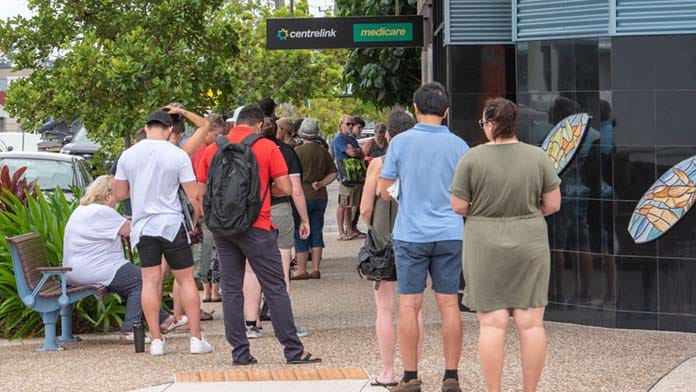The coronavirus pandemic means the world is facing a major recession, if not an outright depression. Scott Morrison has announced an enormous $189 billion in economic measures in response—but his focus is overwhelmingly on bailouts for business, not protecting workers.
The scale of the economic crisis is huge. Investment bank Goldman Sachs has predicted a catastrophic 24 per cent drop in the US economy over the next three months as the economy faces a “sudden stop”. Stockmarkets in the US and Australia have both dropped by around 35 per cent, with the American Federal Reserve moving to inject $1.5 trillion in short term loans and securities purchases in an attempt to prevent collapse.
There have been mass sackings across retail, the arts and hospitality industries as people avoid leaving home.
Qantas has announced it will stand down 20,000 workers, forcing them to either use up leave entitlements or go without pay, despite the government committing to a $715 million bailout. A Roy Morgan poll found 60 per cent of Australian businesses have already been affected.
Universities have been hit hard by the loss of revenue from fee-paying international students stranded by border closures.
They have already announced major austerity measures. Casual workers in particular have been left in the lurch, with casual academics in the firing line for job losses and the entire workforce feeling the pressure of moving classes online.
Many more have lost their jobs following the government’s decision to force cafes, pubs and restaurants to close in an effort to stop the spread of the virus. But workers should not be made to pay for this through being unable to cover the bills.
Morrison has announced a temporary doubling of Newstart payments for those out of work. But this will not be enough for some workers to cover their rents and mortgages.
All workers should receive paid leave for any periods where companies are shut down.
This is a particular issue for casuals, who have no right to sick leave if they catch the virus. According to the ACTU, there are 3.3 million casual workers in Australia with no access to paid leave.
Propping up business
But 70 per cent of Morrison’s stimulus spending is being spent on propping up business, not supporting insecure workers. This includes up to $100,000 in cash payments for small business in an attempt to encourage them not to sack workers, and providing $20 billion to help underwrite loans of up to $250,000 per company.
Morrison’s aim is to save capitalism from collapse. Most of the spending is temporary over the next six months, in the hope of aiding a quick recovery a few months from now.
The increases to welfare payments, for instance, are delayed with the doubling of Newstart not kicking in for five weeks and a second one-off $750 payment for other welfare recipients including pensioners, disability pensioners, carers, and those receiving family tax only arriving on 13 July.
The increases to welfare payments need to be made permanent to ensure people are not forced back into poverty when they expire. Newstart payments have not been increased in real terms since 1994 and give recipients just $40 per day to live off.
The economic fallout from coronavirus is expected to last much longer than six months. Economists who spoke to the Sydney Morning Herald and The Age are predicting the unemployment rate will rise to 15 per cent, the highest since the Great Depression.
Morrison’s spending to keep businesses afloat far outweighs what he is spending on the health measures to combat coronavirus of just $2.4 billion.
But the scale of the $189 billion spending shows how hollow the usual government claims that we “can’t afford” to fund proper health and education services or jobs are.
The tens of billions of dollars being spent to prop up business could be used to create socially useful work for health and human needs. In Victoria, the Andrews state government is committing $500 million to fund jobs in cleaning, food services, health care and deliveries for those thrown out of work. This could be massively expanded.
In NSW, the nurses’ union has called for the state government to bring forward its promise to fund jobs for 5000 new nurses.
If the government is spending millions to bail out companies like Qantas, it should nationalise them and ensure workers’ jobs are protected.
With interest rates at historic lows, the government could expand healthcare jobs and provide food deliveries support for people who are sick or self-isolating due to coronavirus, and start planning to build renewable energy infrastructure to deal with the climate crisis. Workers should not pay for the medical and economic disaster capitalism has created.
By Ruby Wawn





